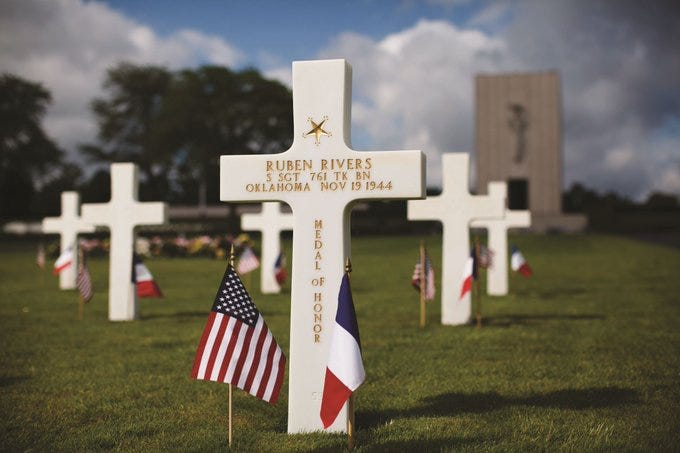On November 16, 1944, U.S. Staff Sergeant Ruben Rivers’ tank ran over and detonated a mine while his company advanced against German forces in northeastern France. Shrapnel gashed his leg to the bone. He refused evacuation or even morphine to instead jump into another tank and continue leading his platoon. Three days later, his company faced heavy German fire, causing his commanding officer, Captain David J. Williams, to order a retreat. Over the radio, Rivers yelled back that he had seen an anti-tank position, exclaiming “I see 'em. We'll fight 'em!” Rivers trained fire at that position, allowing the rest of his company to reach safety. Moments later, a German anti-tank unit struck his tank, killing him instantly.
Impressed with his bravery, within days Captain Williams applied for Rivers to receive the Medal of Honor, our nation’s most prestigious military honor.

Among the many stories worth honoring today, you may be wondering why I’m sharing Staff Sergeant Rivers’ story.
The first reason is that he was half-black and half-Cherokee. He sacrificed his life for the freedom of others—freedoms that he didn’t have back home in Oklahoma. He sacrificed his life for a country that tried to erase half his ancestors while enslaving the other half. He sacrificed his life in service of a military that treated him as inferior, providing substandard supplies and living conditions to units like his.
I’m also sharing his story because it took 53 years for the military to follow through on Captain Williams’ request. In January 1997, President Bill Clinton awarded the Medal of Honor posthumously to Staff Sergeant Rivers and six other African-American men for their bravery during World War II. During and immediately after the war, the military awarded 450 Medals of Honor. Of those, seven were awarded to Native American soldiers; none were awarded to black soldiers. It wasn’t until a 1990’s Army-commissioned study of racial prejudice in award determination that those seven men received the honor.
Thus, Rivers died to protect people who treated him as inferior. Then, he was denied the same regard of honor for that act because of that same supposed inferiority. Thankfully that part changed in 1997.

Armed with this knowledge, I have one request. Before moving on to burger flipping or swimming on this Memorial Day, pause to remember veterans who made the ultimate sacrifice for our country. Then, take another moment to reflect on soldiers like Staff Sergeant Ruben Rivers who did so despite being denied basic human rights in the country they defended.
You can read more about Ruben Rivers here. You can also read about Native American Medal of Honor recipients, like Second Lieutenant Ernest Childers or First Lieutenant Jack Montgomery.




Important to know - thanks!
Thanks for the reminder Sam.